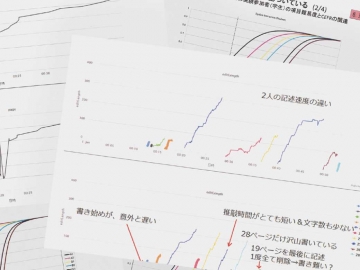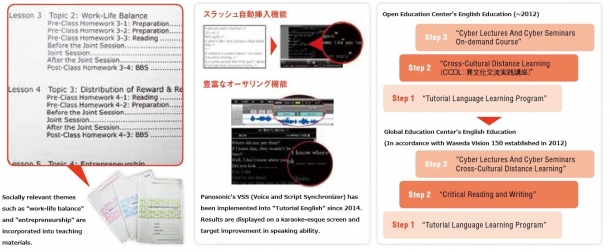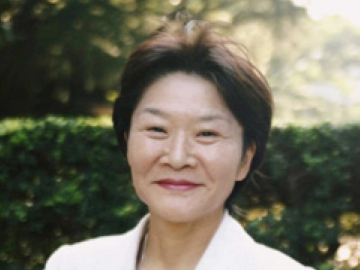Waseda University’s English education program based on cutting edge applied linguistics research
Mon, Feb 16, 2015-
Tags
Professor Michiko Nakano has been involved in English education at Waseda University for over 25 years. Below, Professor Nakano shares details about the “Tutorial English” program and what makes Waseda University a pioneer in English education.
Study English at Waseda University, pioneer of practical English education
I obtained my MA and PhD in applied linguistics at the University of Edinburgh and took courses in psychology, cognitive science, and artificial intelligence. I also studied computer science and mathematics as part of the statistics component of my program. Using what I learned, I started developing Waseda University’s “Tutorial English,” an education program that focuses on strengthening practical English ability and assessing students’ progress.
Waseda University’s English education program prepares students to use English in society. The program is adjusted to individual students’ levels and assists them in steadily developing their English ability. A distinct feature of the program is that an individual can attend lectures not only on campus, but also from a personal computer. This feature enables students to learn, practice, and reinforce their English based on their own needs.
“Tutorial English” began in 1997 when President Takayasu Okushima strengthened the IT infrastructure of the University. At this time, the English education program was implemented into the distance education system, a system that did not require students to be physically present in the classroom. This distance education system was the prototype for “Tutorial English.” The Cross-Cultural Program was established the following year as part of a network with Digital Campus Consortium and enabled students from Waseda University, Korea University, De La Salle University, University of Malaya, and University of Essex to interact and learn about each other’s countries and cultures via online communication.
Teaching materials for 3 levels of “General Tutorial English” were developed in 2001 and the program was implemented as a regular course in the Open Education Center the following year. In order to use English in society, students must reinforce the English they learn through high school and use it naturally. With this goal in mind, we referenced the 6 language levels established by the Common European Framework of References (CEFR) for Languages and consisting of beginner, intermediate, and advanced levels, completed all 6 levels of our program in 2007. We then developed original teaching materials designed to enable students to progress through each level. In the Cross-Cultural Distance Learning Program, articles from the New York Times about food safety, work-life balance, global partnership, entrepreneurship, and patent licensing were incorporated into the teaching materials. Many students praised the program because they felt the material was useful for life after graduation.
The Comprehensive Education Assessment System known as “LAK”
Students’ levels are determined by the online English language assessment test, WeTec. There is also an achievement test that continuously evaluates students’ achievements and levels based on CEFR. After every 6 classes, there is a unit review test that assesses vocabulary, phrasal knowledge, and listening and gives personalized feedback.
As technology advances and new education tools are introduced, we provide detailed assessments of students’ progress. For reading comprehension, we are able to assess students’ ability, interest, knowledge, strategy, and learning patterns. The amount of time students spend on certain passages is also recorded. Through this comprehensive assessment system, we guide students and help them improve effectively. This assessment system is known as Learning Analytics and Knowledge (LAK) and is the result of cutting edge research. It is thanks to the cooperation of ICT and the Science and Engineering Research Institute’s ‘Next Generation e-learning’ that we are able to implement this effective system.
We intend to continue collaboration with ICT and develop a system that assesses speaking and writing ability with analysis and feedback effective in improving students’ critical reading and writing skills.
Our research is conducted for the sake of students
The questions “What can I do for students?” and “What can I do for Waseda University?” push me to develop English education. Tutorial English is developed with the vision of enabling students to conduct discussions in English. I was deeply moved when I witnessed a student tell their friend “Tutorial English is awesome!’ and recommend that they too enroll in the program. Students who study abroad also tell me they have great experiences overseas thanks to the Tutorial English program. When this program was first established, most students were beginner or intermediate. Presently, more than half of our students are at the advanced level which is testament to the improvement of our students’ English ability.
I have great memories of my 25 years at Waseda University and helping students has kept me energized no matter how busy I become. I will be retiring in March of this year but hope to continue my research going forward.
Michiko Nakano – Faculty of Education and Integrated Arts and Sciences
Michiko Nakano graduated from Tsuda College where she also obtained her MA. She later completed the PhD program at University of Edinburgh for applied linguistics. While working at Aichi University, she received training in Cognitive Science at the University of Edinburgh’s Institute for Research in Cognitive Science. In 1990, she became an assistant professor and became a professor in 1992. She conducted research at the Center for the Study of Language and Information and has been the associate director of the Center for Higher Education Studies and director of the Center for Teaching, Learning and Technology since 2002. She will retire from Waseda University at the end of March, 2015. Notable works from Michiko Nakano include ‘The Waseda Method for Global Communication (Toyo Keizai)’ ‘Global Design for English Education (Waseda University),’ and ‘Media Use in English Education (A Series of Studies on English Education).”
















